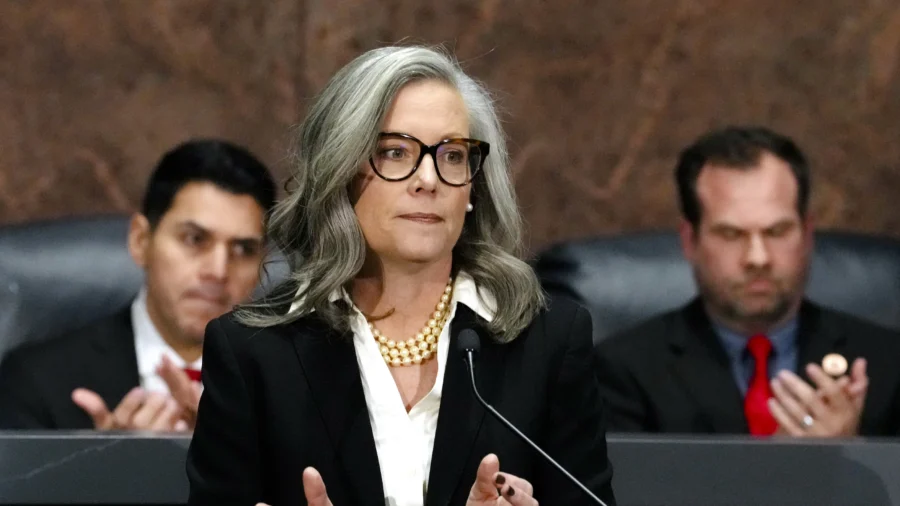Arizona Gov. Katie Hobbs has unveiled a sweeping proposal to block U.S. land ownership by foreign adversaries, following her veto of a Republican-backed bill that targeted land purchases by entities linked to the Chinese Communist Party (CCP).
Hobbs, a Democrat, vetoed Senate Bill 1109, which would have sharply restricted Chinese ownership of land in Arizona, on June 2. In her veto message, she criticized the bill as being too narrow in scope and failing to provide clear criteria for implementation.
Her new proposal, formally titled the Blocking Adversarial Nations Act, was announced on June 9. The legislation expands restrictions beyond China to include all nations designated as foreign adversaries, such as Russia, North Korea, and Iran, while also authorizing the state to call in the FBI to investigate land purchases suspected to involve espionage.
The new bill also closed what Hobbs called loopholes in the original version, such as a provision allowing Chinese entities to acquire property in Arizona as long as they divest after three years.
“I proudly vetoed weak and spineless legislation that would let the People’s Republic of China own land in Arizona for three years,” Hobbs said in a statement. “The bill would have damaged Arizona’s security, allowing the CCP to exploit loopholes and spy on Arizona’s military bases and critical infrastructure with impunity.”
Hobbs’s proposal arrives amid fierce criticism from state Republicans, including Kari Lake, her former gubernatorial rival.
“It wasn’t just about military bases,” “There’s also strategic assets mentioned in this legislation, including the new Taiwanese semiconductor factories in Pheonix, we’ve got the biggest nuclear powerplant … all areas that would have catastrophic implications if infiltrated by the CCP.”
Arizona Senate President Warren Petersen said on the social media platform X that he plans to call a vote to override the governor’s veto, which would require support from the upper chamber’s Democrats, none of whom voted for the original bill when it passed on May 28.
Another China-related measure Hobbs vetoed in this legislative session was House Bill 2693, which aimed to restrict the use of technology produced by certain Chinese genomics companies in state-sponsored health care programs.
Specifically, the bill would have allowed insurance providers and Arizona’s Medicaid program to limit coverage for genetic sequencing performed using equipment or software from companies based in foreign adversary nations, particularly those identified by the Department of Defense as linked to the Chinese military or by the Department of Commerce as complicit in human rights abuses in China. It also would have required health care institutions and research facilities to stop using genetic sequencers or software from these foreign adversaries.
Supporters argued during hearings that the measure was critical to protecting the genetic data of Arizona residents from being transferred to CCP-controlled entities. In her veto message, Hobbs simply wrote that the bill is “unnecessary,” without further elaboration.
The bill’s sponsor, state Rep. Leo Biasiucci, had earlier championed House Bill 2109, which Hobbs signed into law. Now known as the Arizona End Organ Harvesting Act, the law allows insurers and state Medicaid to deny or restrict coverage for patients seeking organ transplants in China, Hong Kong, or where the organs are suspected to have come from jurisdictions under CCP control. Hobbs had vetoed an earlier version of the anti-organ harvesting measure in 2024, which had included provisions of House Bill 2693.
In addition, Hobbs vetoed Senate Bill 1027, which would have prohibited the use of telecommunications technology manufactured in China. It was drafted to address concerns that the CCP may exploit Chinese-made radio technology for espionage and sabotage, including capturing and disrupting highly restricted military communications.
“We need to take necessary steps to protect our critical infrastructure, but SB 1027 is not a realistic way to do so,” the governor said in her veto message. “This bill’s broad language would create undue difficulty for the business community and generate costs to taxpayers.”



